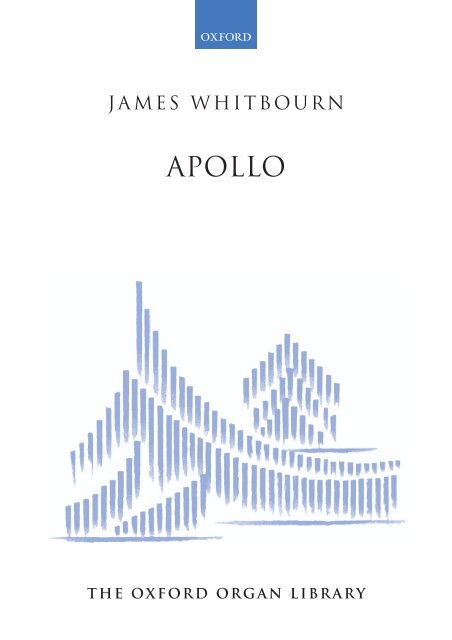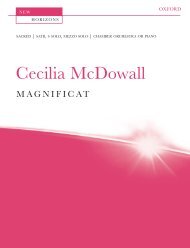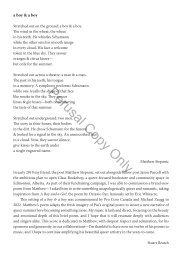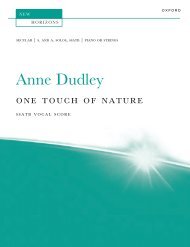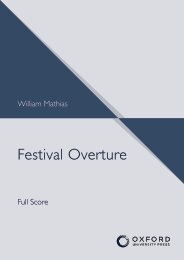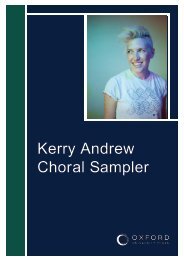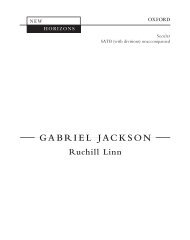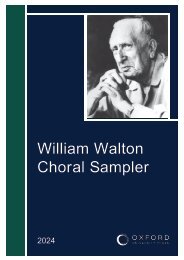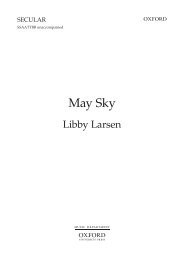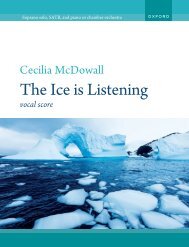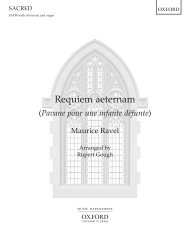James Whitbourn - Apollo
James Whitbourn's Apollo tells the story of the first manned flight to the Moon (the year before the first lunar landing). A wealth of imaginative textures depicts such dramatic events as countdown, ignition, and the first sight of earthrise, leading to a fantasia on an ancient Greek melody, and a final triumphant Paean.
James Whitbourn's Apollo tells the story of the first manned flight to the Moon (the year before the first lunar landing). A wealth of imaginative textures depicts such dramatic events as countdown, ignition, and the first sight of earthrise, leading to a fantasia on an ancient Greek melody, and a final triumphant Paean.
Create successful ePaper yourself
Turn your PDF publications into a flip-book with our unique Google optimized e-Paper software.
2<br />
JAMES WHITBOURN<br />
APOLLO<br />
THE OXFORD ORGAN LIBRARY
JAMES WHITBOURN<br />
APOLLO<br />
for online perusal only<br />
watch performance on<br />
A
PREFACE<br />
<strong>Apollo</strong> brings together two stories of discovery spanning two thousand years. The<br />
musical themes come from the first notated musical work whose composer is known:<br />
the first of two hymns to <strong>Apollo</strong> composed by the Ancient Greek singer Athénaios<br />
in around 128 BC 1 . In this work, I have transformed the themes into a narrative that<br />
traces the first human spaceflight mission to leave Earth and to voyage to another<br />
celestial body—the Moon. The piece was commissioned for a first performance in<br />
Houston, Texas, close to the NASA base, and the subject was chosen to reflect the<br />
work’s place of origin. I am grateful to those Houston-based employees of NASA<br />
who have graciously provided factual information and ideas.<br />
<strong>Apollo</strong> begins with a statement of the first verse of Athénaios’s hymn followed by a<br />
flourish that leads to the beginning of the narrative sequence. The narrative starts<br />
in the command module as its occupants await ignition, with a gentle throbbing<br />
heard from within. Then comes the countdown followed quickly by ignition—an<br />
explosion of energy as the rocket is thrust towards the skies. Once in space, the<br />
narrative continues with the first naked-eye sight of the far side of the Moon. This<br />
section uses the mysterious second verse of Athénaios’s hymn, with its unusual,<br />
harmonically-twisting melody. Then comes one of the most famous images of that<br />
mission—Earthrise: the first sighting of planet Earth rising above the horizon of<br />
the Moon, witnessed by astronauts Commander Frank Borman, Command Module<br />
Pilot <strong>James</strong> Lovell, and Lunar Module Pilot William Anders. Earthrise leads to<br />
another famed moment, when, just before lunar sunrise, the astronauts, in their<br />
1968 Christmas Eve broadcast from the lunar module, successively read passages<br />
from Genesis, starting with William Anders, who reads the opening verses in the<br />
King <strong>James</strong> Version of the Bible. The slow, loud major chords which represent that<br />
moment cascade into the final Paean.<br />
for online perusal only<br />
The French hue that pervades the music reflects the circumstances of the discovery<br />
of the ancient hymns, which were uncovered in Delphi in 1893 by the French<br />
archaeologist Théophile Homolle, and transcribed into modern musical notation<br />
by Théodore Reinach the same year (his version of the melody differs slightly from<br />
that used in <strong>Apollo</strong>, since I have completed missing notes in my own way). Gabriel<br />
Fauré later published a version of the hymn for voice and piano using Reinach’s<br />
transcription and his own accompaniments.<br />
<strong>James</strong> <strong>Whitbourn</strong><br />
St Stephen’s House, Oxford<br />
1 These can be found in several anthologies and publications. For most recent scholarship,<br />
see Egert Pöhlmann and Martin L. West, Documents of Ancient Greek Music, Oxford (2001), pp. 62–5
Commissioned by <strong>James</strong> Roman, Houston, Texas<br />
and first performed on 13 July 2019 within the Space City New Music Festival, Houston<br />
<br />
<br />
<br />
<br />
<br />
<br />
<strong>Apollo</strong><br />
JAMES WHITBOURN<br />
<br />
<br />
<br />
<br />
<br />
<br />
<br />
<br />
<br />
<br />
for online perusal only
4<br />
<br />
<br />
<br />
<br />
<br />
<br />
<br />
<br />
<br />
<br />
<br />
<br />
<br />
<br />
<br />
<br />
<br />
<br />
<br />
<br />
<br />
<br />
<br />
<br />
<br />
<br />
<br />
<br />
<br />
<br />
<br />
<br />
<br />
<br />
<br />
<br />
<br />
<br />
<br />
<br />
<br />
<br />
<br />
<br />
<br />
<br />
<br />
<br />
<br />
<br />
<br />
<br />
<br />
<br />
<br />
<br />
<br />
<br />
<br />
for online perusal only
5<br />
<br />
<br />
<br />
<br />
<br />
<br />
<br />
<br />
<br />
<br />
<br />
<br />
<br />
<br />
<br />
<br />
<br />
<br />
for online perusal only
6<br />
<br />
<br />
<br />
<br />
<br />
<br />
<br />
<br />
<br />
<br />
<br />
<br />
<br />
<br />
<br />
<br />
<br />
<br />
<br />
<br />
<br />
<br />
<br />
<br />
<br />
<br />
<br />
<br />
<br />
<br />
<br />
<br />
<br />
<br />
<br />
<br />
<br />
<br />
<br />
<br />
<br />
<br />
<br />
<br />
<br />
<br />
<br />
<br />
<br />
<br />
<br />
<br />
<br />
<br />
<br />
<br />
<br />
<br />
<br />
<br />
<br />
<br />
<br />
<br />
<br />
<br />
<br />
<br />
<br />
<br />
<br />
<br />
<br />
<br />
<br />
<br />
<br />
<br />
<br />
<br />
<br />
<br />
<br />
for online perusal only
7<br />
<br />
<br />
<br />
<br />
<br />
<br />
<br />
<br />
<br />
<br />
<br />
<br />
<br />
<br />
<br />
<br />
<br />
<br />
<br />
<br />
<br />
<br />
<br />
<br />
<br />
<br />
<br />
<br />
<br />
<br />
<br />
<br />
<br />
<br />
<br />
for online perusal only
8<br />
<br />
<br />
<br />
<br />
<br />
<br />
<br />
<br />
<br />
<br />
<br />
<br />
<br />
<br />
<br />
<br />
<br />
<br />
<br />
<br />
<br />
<br />
<br />
<br />
<br />
<br />
<br />
<br />
<br />
<br />
<br />
<br />
<br />
<br />
<br />
<br />
<br />
<br />
<br />
<br />
<br />
<br />
<br />
<br />
<br />
<br />
<br />
<br />
<br />
<br />
<br />
<br />
<br />
<br />
<br />
<br />
<br />
<br />
<br />
<br />
<br />
<br />
<br />
<br />
<br />
<br />
<br />
<br />
<br />
<br />
<br />
<br />
<br />
<br />
for online perusal only
9<br />
<br />
<br />
<br />
<br />
<br />
<br />
<br />
<br />
<br />
<br />
<br />
<br />
<br />
<br />
<br />
<br />
<br />
<br />
<br />
<br />
<br />
<br />
<br />
<br />
<br />
<br />
<br />
<br />
<br />
<br />
<br />
<br />
<br />
<br />
<br />
for online perusal only
10<br />
<br />
<br />
<br />
<br />
<br />
<br />
<br />
<br />
<br />
<br />
<br />
<br />
<br />
<br />
<br />
<br />
<br />
<br />
<br />
<br />
<br />
<br />
<br />
<br />
<br />
<br />
<br />
<br />
<br />
<br />
<br />
<br />
<br />
<br />
<br />
<br />
<br />
<br />
<br />
<br />
<br />
<br />
<br />
<br />
<br />
<br />
<br />
<br />
<br />
<br />
for online perusal only
11<br />
<br />
<br />
<br />
<br />
<br />
<br />
<br />
<br />
<br />
<br />
<br />
<br />
<br />
<br />
<br />
<br />
<br />
<br />
<br />
<br />
<br />
<br />
<br />
<br />
for online perusal only
12<br />
<br />
<br />
<br />
<br />
<br />
<br />
<br />
<br />
<br />
<br />
<br />
<br />
<br />
<br />
<br />
<br />
<br />
<br />
<br />
<br />
<br />
<br />
<br />
<br />
<br />
<br />
<br />
<br />
<br />
<br />
<br />
<br />
<br />
<br />
<br />
<br />
<br />
<br />
<br />
<br />
<br />
<br />
<br />
<br />
<br />
<br />
<br />
<br />
<br />
for online perusal only
13<br />
<br />
<br />
<br />
<br />
<br />
<br />
<br />
<br />
<br />
<br />
<br />
<br />
<br />
<br />
<br />
<br />
<br />
<br />
<br />
<br />
<br />
<br />
<br />
<br />
<br />
<br />
<br />
<br />
<br />
<br />
<br />
<br />
<br />
<br />
<br />
<br />
<br />
<br />
<br />
<br />
<br />
<br />
<br />
<br />
<br />
<br />
<br />
<br />
<br />
<br />
<br />
<br />
<br />
<br />
<br />
<br />
<br />
<br />
<br />
<br />
<br />
<br />
<br />
<br />
<br />
<br />
for online perusal only
14<br />
<br />
<br />
<br />
<br />
<br />
<br />
<br />
<br />
<br />
<br />
<br />
<br />
<br />
<br />
<br />
<br />
<br />
<br />
<br />
<br />
<br />
<br />
<br />
<br />
<br />
<br />
<br />
<br />
<br />
<br />
<br />
<br />
<br />
<br />
<br />
<br />
<br />
<br />
<br />
<br />
<br />
<br />
<br />
<br />
<br />
<br />
<br />
<br />
<br />
<br />
<br />
<br />
<br />
<br />
<br />
<br />
<br />
<br />
<br />
<br />
<br />
<br />
<br />
<br />
<br />
<br />
for online perusal only
15<br />
<br />
<br />
<br />
<br />
<br />
<br />
<br />
<br />
<br />
for online perusal only
16<br />
<br />
<br />
<br />
<br />
<br />
<br />
<br />
<br />
<br />
<br />
<br />
<br />
<br />
<br />
<br />
<br />
<br />
<br />
<br />
<br />
<br />
<br />
<br />
<br />
<br />
<br />
<br />
<br />
<br />
<br />
<br />
<br />
<br />
<br />
<br />
<br />
<br />
<br />
<br />
<br />
<br />
<br />
<br />
<br />
<br />
<br />
<br />
<br />
<br />
<br />
<br />
for online perusal only


